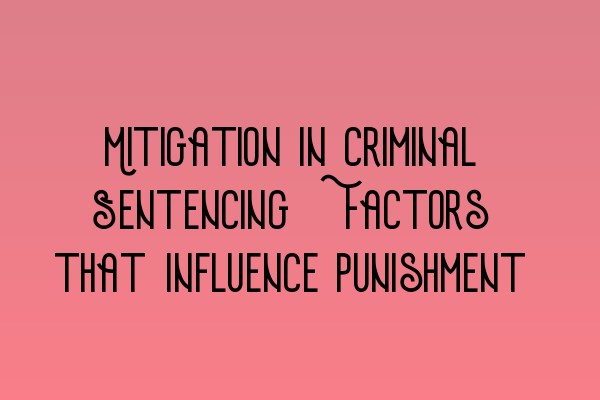Mitigation in Criminal Sentencing: Factors that Influence Punishment
When it comes to criminal sentencing, a crucial aspect that must be considered is mitigation. Mitigation refers to factors or circumstances that may decrease the severity of the punishment imposed on an offender.
In this article, we will explore the various factors that can influence the outcome of a criminal sentencing, shedding light on the importance of mitigation in the overall process.
Factors Considered in Mitigation
Several factors can impact the degree of mitigation in a criminal sentencing. These factors include:
- The defendant’s prior criminal record
- The defendant’s level of cooperation with the investigation and prosecution
- The presence of remorse or contrition shown by the defendant
- The defendant’s age and personal circumstances
- The presence of any mental health issues
- The existence of any compelling reasons for leniency
- The impact of the offence on the victim or society
Each of these factors plays a crucial role in determining the level of mitigation and can significantly influence the punishment imposed by the court.
The Importance of Effective Mitigation
Effective mitigation is essential in securing a more favorable outcome in criminal sentencing cases. It provides an opportunity for defendants to present their case in a way that highlights any mitigating circumstances that might have contributed to their actions.
By presenting persuasive and relevant mitigating factors, defendants can potentially reduce the severity of the punishment they receive. This can range from a reduction in the length of a custodial sentence to the imposition of alternative forms of punishment, such as community service or rehabilitation programs.
It is crucial for defendants to work closely with their legal counsel to develop a comprehensive mitigation strategy that highlights their unique circumstances and presents a compelling case for leniency.
Seeking Professional Legal Assistance
Given the complexity of criminal sentencing and the potential consequences involved, it is strongly advised to seek professional legal assistance. Experienced criminal solicitors can provide invaluable guidance and expertise in navigating the intricacies of mitigation and achieving the best possible outcome for their clients.
If you are preparing for the SQE Criminal Law & Practice Law UK examination, it is crucial to have a solid understanding of mitigation. Familiarizing yourself with this topic can greatly enhance your knowledge and enable you to answer related questions in the exam effectively.
To further enhance your preparation, consider exploring the following related resources:
- SQE 1 Practice Exam Questions
- SQE 1 Practice Mocks FLK1 FLK2
- SQE 2 Preparation Courses
- SQE 1 Preparation Courses
- SRA SQE Exam Dates
By exploring these resources, you can complement your knowledge of mitigation and enhance your overall preparation for the SQE Criminal Law & Practice Law UK examination.
In conclusion, mitigation plays a vital role in criminal sentencing, allowing defendants to present relevant circumstances that can reduce the severity of their punishment. Understanding the factors that can influence mitigation and seeking professional legal assistance are crucial steps in achieving a more favorable outcome. Good luck with your SQE preparations!
